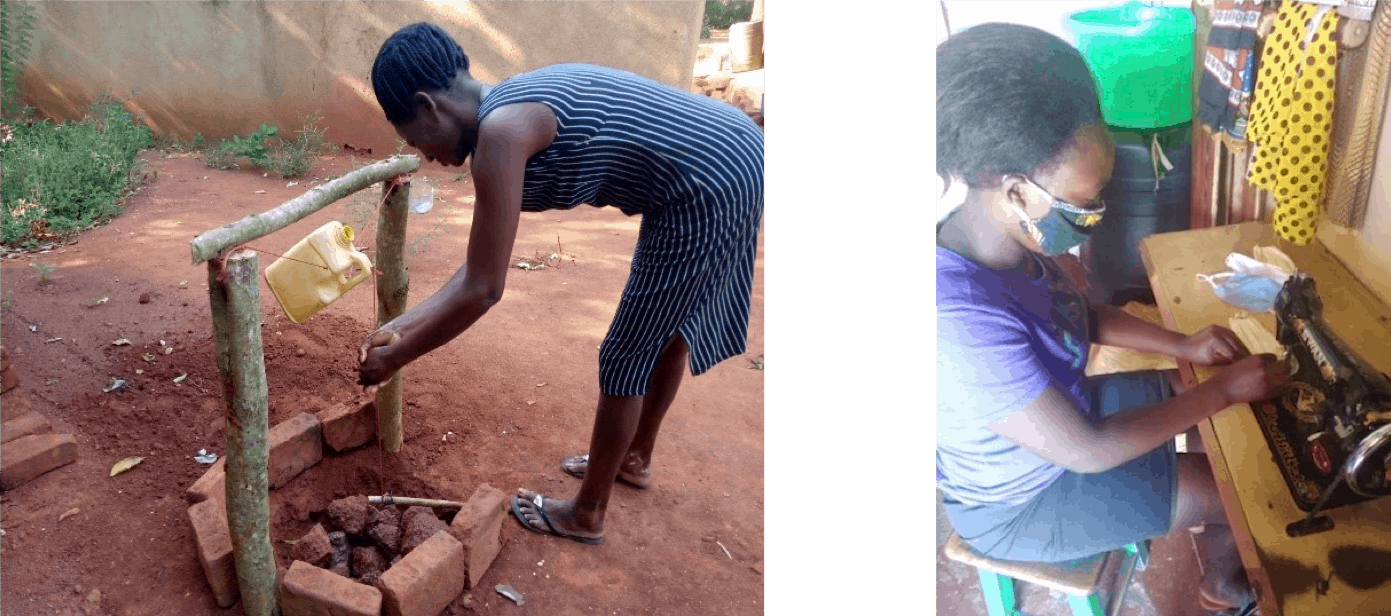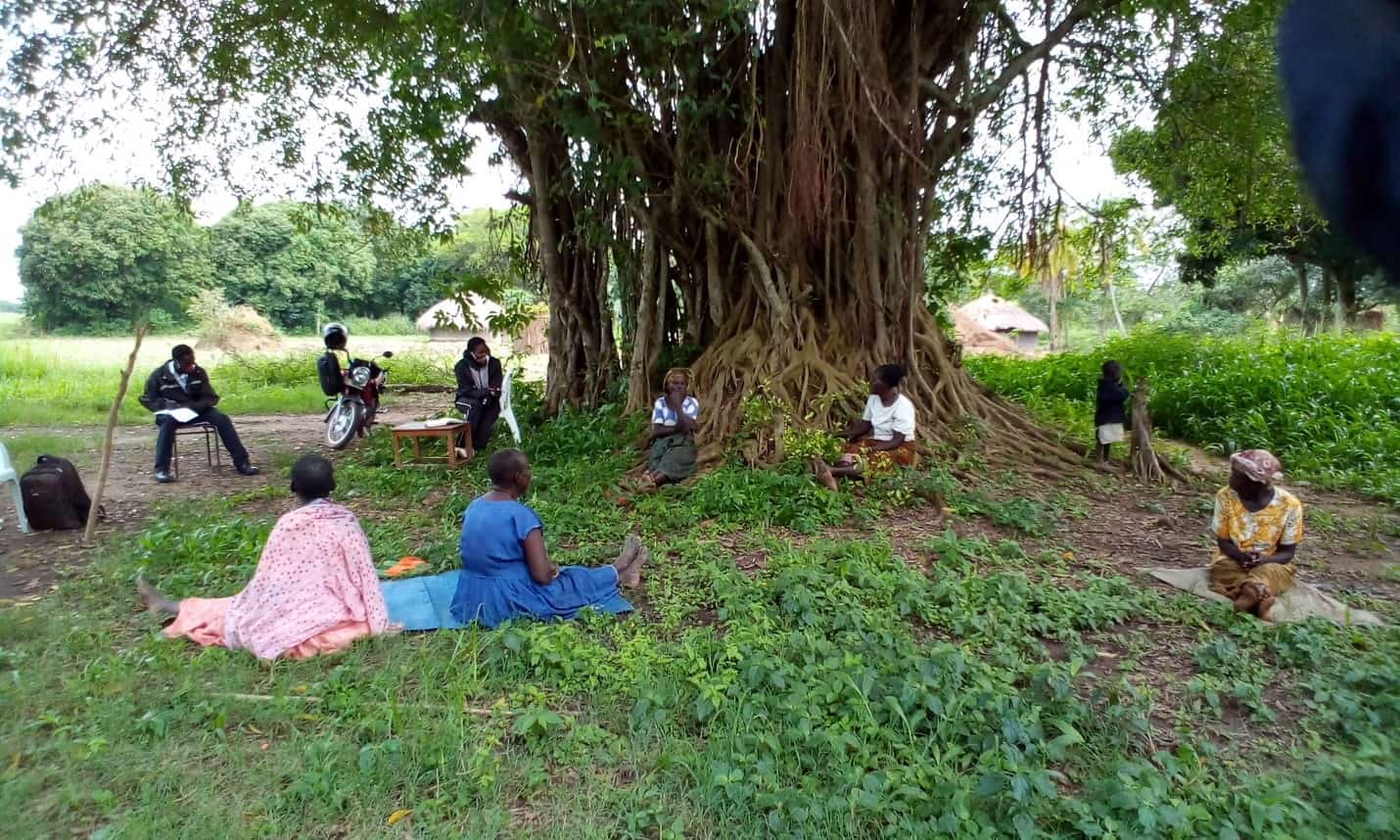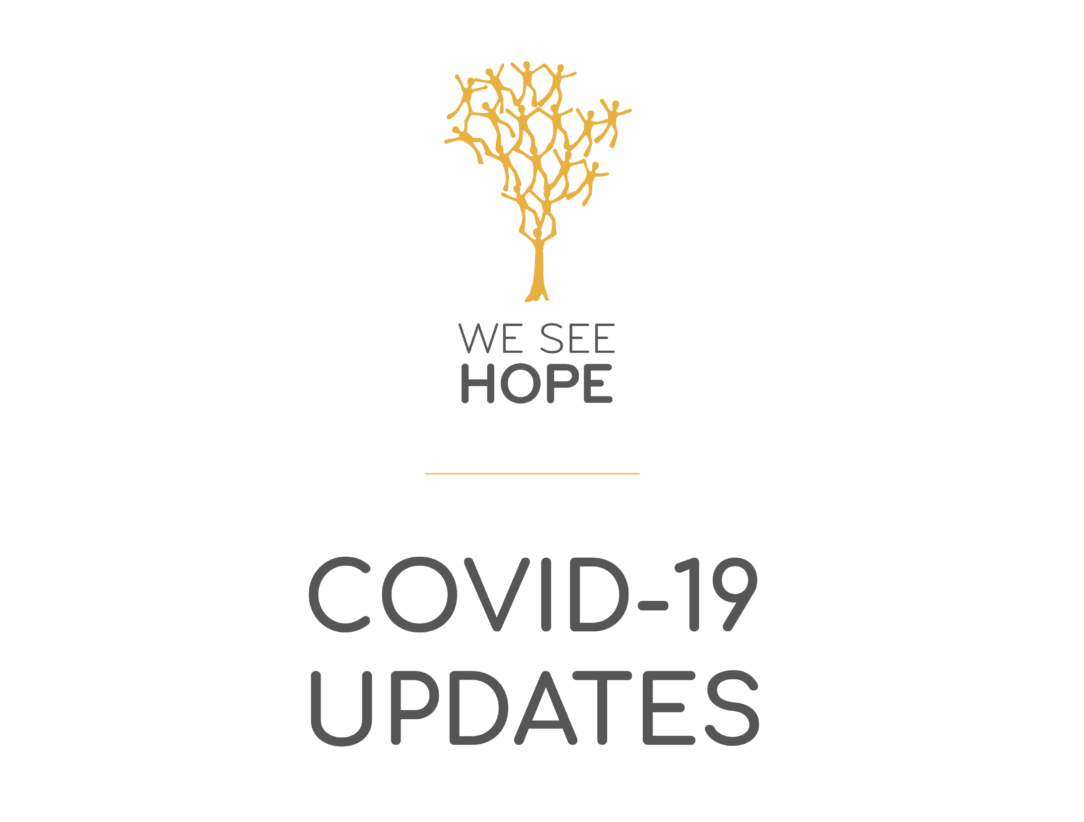On this page, we will be providing updates about how we are responding to COVID-19 with our partners in Kenya, Malawi, Tanzania, Uganda and Zimbabwe. You will find the latest information at the top of the page. If you have any questions, please don’t hesitate to get in touch at Hello@WeSeeHope.org.uk.
5th November 2020
A few weeks ago, we recorded a conversation with our Africa Director, Oswald Malunda, about our immediate response to the COVID-19 pandemic and our focus moving forward. He discusses how our community-led approach allowed us to continue some key programme activities during the lockdowns in Kenya, Malawi, Tanzania, Uganda and Zimbabwe, providing support to vulnerable children and their families. Take a look for yourself to find out more!
We are so appreciative of all the support we’ve received during this critical time. Thank you.
22nd July 2020
On 8th July, the World Health Organization reported that confirmed cases of COVID-19 in Africa had surpassed 500,000 and that in 22 of the 54 countries, numbers had more than doubled in a month. Alarmingly, two weeks later, there are now over 700,000 cases.
As John Nkengason, Director of the Africa Centres for Disease Control and Prevention, reiterated; “The pandemic is gaining full momentum.”
The number of cases in Malawi, Tanzania, Uganda and Zimbabwe is still unclear primarily due to a lack of testing. But in Kenya there has been a sharp rise and in response, the government has closed schools until January 2021.
Restrictions on movement are being lifted in each of the five countries, so our partners are cautiously resuming some programme activities, including training in small groups and monitoring. We have provided funds for hand sanitiser and masks for team members and are in regular communication with them about day-to-day changes to the situation.
Our focus remains on protecting communities against COVID-19 and helping to sustain programme activities to build social and economic resilience.
SHARING INFORMATION – PROTECTING AGAINST COVID-19
All of our partners are continuing to share information about COVID-19 symptoms and prevention measures, and have been working with communities to put systems in place to help protect them, including:
- Community volunteers and members of our Village Investors Programme (VIP) in Mbale, Uganda, and Ruwombwe, Zimbabwe, have installed “Tippy Taps” – low-cost hand washing facilities made from locally available materials – in their homes and communities.
- In Ngodzi, Malawi, every VIP member has made their own face mask and put hand washing facilities in their homes.
- Six VIP groups in Nairobi, Kenya, are now engaged in soap making.
- VIP groups in Busia and Loitokitok, Kenya, have also changed their income generating activities to making face masks and soap.

A VIP member at a community Tippy-Tap in Mbale, Uganda (left), and a VIP member making face masks in Busia, Kenya (right).
Where possible, group meetings are continuing to happen with social distancing in place or as smaller clusters. For example, community volunteers from our Kids’ Club Programme in Gulu and Mbale, Uganda, have split children into groups of 10 and are meeting with them to provide counselling support.
We are relieved that currently there are no reported cases of COVID-19 among the children, parents and guardians, or community volunteers who we are working with.
BUILDING RESILIENCE – SUSTAINING PROGRAMME ACTIVITIES
Our priority is to help communities maintain economic activity, to support and protect vulnerable children, and to improve food security which is a significant issue during this time. This includes:
- In Busia, Loitokitok and Nairobi, Kenya, an additional 20 VIP groups have adopted a Mobile Money Plan for their savings and loans activities.
- In Ngodzi, Malawi, 113 vulnerable children have been supported through the Orphan Fund from VIP groups with items such as food and cooking oil.
- Also in Ngodzi, 27 households who are part of our Child Headed Households Programme have harvested their personal food gardens and have enough food to last them for the year. Most heads of the households have also joined VIP groups.
- The 37 households who are part of the same programme in Ntoroko, Uganda, have started to harvest and safely store beans, sweet potatoes and cassava which they planted. Guardians have also been sharing COVID-19 information with the households, as well as how to protect themselves against the rising physical and sexual violence levels that are being reported in communities.
- In Pader, Uganda, 12 children from our Child Rights Programme have called into local radio stations to advocate for child rights.
- In Gulu, Uganda, 30 VIP groups have been planting crops that will be ready to harvest in October.
- In Mbale, Uganda, over 80% of Kids’ Club members’ households have established food gardens and planted maize and beans, which are now being harvested.
As ever, we are assessing the ongoing impact on communities and preparing for when all programme activities can safely resume.
We are so appreciative of the support we have received and will continue to keep you updated. Thank you.

Community Action Group volunteers from our Child Rights Programme in Gulu, Uganda, meeting in a small, socially distanced group with our partner, Oasis.
1st June 2020
Across Kenya, Malawi, Tanzania, Uganda and Zimbabwe, nationwide restrictions have been in place since the end of March to prevent the spread of COVID-19, including the closure of schools and limits on mass gatherings. Although some of these are now starting to be eased, their impact has been – and will continue to be – felt acutely by “low-income households and those working in the informal economy due to their loss of livelihoods and inability to access markets.” [World Health Organization]
Together with our partners, our focus is on improving awareness about COVID-19 in the poor and isolated communities we are working with, whilst also reducing negative social and economic impacts through key programme activities.
SHARING INFORMATION – EDUCATING AND SENSITIZING
As they continue to work from home, our partners are providing information via phone to community volunteers from our programmes about the symptoms of COVID-19 and prevention measures – such as more frequent hand washing and social distancing. The volunteers are then disseminating this information to their wider communities.
As a result, programme meetings (where possible) have been amended to ensure social distancing can be adhered to. Additionally, some activities have been reshaped to produce hygiene products.
- In Mbale, Uganda, savings and loans groups from our Village Investors Programme (VIP) have used money from their group income generating activities to buy hand washing facilities for their communities.
- Tailoring students who are part of our Vocational Training Programme in Ngodzi, Malawi, and Zanzibar are making face masks for their communities, as are VIP groups in Rombo, Kenya.
Our partners are also finding ways to share information directly with children in communities. For example, in Pader, Uganda, our partner is phoning into local radio shows that have been put on for children whilst they are off school to encourage them to make hand washing facilities in their homes.
ADAPTING TO THE SITUATION – SUSTAINING PROGRAMME ACTIVITIES
For now, programme activities, such as training, capacity building and face-to-face monitoring, are suspended until the end of June in order to protect the communities and our partner staff. However, we are helping communities remotely to maintain economic activity; to support and protect vulnerable children; and to improve food security in this uncertain and very difficult time.
- Crucially, the majority of VIP groups across the five countries are continuing to run, meeting at a safe social distance or adapting their operations by only meeting in small groups.
- In Rombo, Kenya, our partner has developed a strategy to implement mobile banking for the VIP; so far a total of 15 groups have successfully adopted the new model.
- In Mbale and Pader, Uganda, cases of child rights violations are continuing to be reported as part of our Child Rights Programme, and being referred to the relevant local authorities.
- In Zanzibar, Tanzania, and Mbale, Uganda, community volunteers from our Kids’ Club Programme are providing door-to-door counselling to vulnerable children.
- In Ntcheu, Malawi, community members have continued to coordinate the maize harvest from the communal gardens set up through our Pre-School Programme. All 12 gardens have been harvested and produced 76 bags of 50kg of maize so far (overall, a total of 234 bags of 50kg of maize is anticipated to be produced).
A number of our partners in Uganda have reported that food insecurity is becoming a significant issue. In order to address this, they have reacted quickly to help vulnerable children and households in a number of innovative and forward-thinking ways.
- In Gulu, all vocational training centres were closed down due to lockdown so the trainees were encouraged to invest in agriculture to avoid losing their money whilst they cannot conduct their businesses or training. 15 trainees have hired or borrowed land between 1-2 acres and have planted crops, such as maize and potatoes.
- VIP groups in Mbale have started farming for their group income generating activity; seven groups have hired land for rice growing, and another group is buying and selling cattle.
- Children who are part of our Child Headed Households Programme in Ntoroko have expanded their personal food gardens with the support of community volunteers and will use the increased production for consumption and sale. This has been possible due to the children having more time at home as their schools are shut.
Collaborating closely with our partners, we are assessing the ongoing impact on communities and preparing for when all programme activities can safely resume.
We are so appreciative of the support we have received so far in response to our urgent appeal, and will continue to keep you updated at this critical time. Thank you.
5th May 2020
SHARING INFORMATION – EDUCATING AND SENSITIZING
With nationwide restrictions still in place across Kenya, Malawi, Tanzania, Uganda and Zimbabwe, our partners are continuing to provide remote but very regular support to communities using phone calls and WhatsApp messages whilst they work from home.
They are ensuring vital information about COVID-19 prevention measures – such as more frequent hand washing and social distancing – and signs and symptoms, is reaching them.
- Staff from one of our partners in Pader, Uganda, are calling into local radio shows to share information about prevention measures. They are also highlighting the impact of COVID-19 on child rights and abuse, and discussing ways to protect children whilst at home.
- The team from one of our partners in Mutare, Zimbabwe, are encouraging the installation of ‘Tippy Taps’ – low-cost handwashing facilities made from locally available materials – into communities.
We are seeing that communities are taking this advice on board and are using programme activities to help prevent the spread of COVID-19.
For example, some VIP groups in Mbale, Uganda, are now using their income generating activities to buy hand-washing facilities for their communities and others in in Nairobi, Kenya, have started making and selling homemade soaps and sanitizers.
ADAPTING TO THE SITUATION – SUSTAINING PROGRAMME ACTIVITIES
Thanks to our partners’ expertise and innovation, we are finding ways to continue a number of economic and social programme activities in communities. These are critical to ensuring vulnerable children remain supported and protected at this time.
- One of our partners in Kenya is now trialling the use of mobile banking platforms such as MPESA with VIP groups so they can continue saving and loaning without meeting in person.
- All others have encouraged VIP groups to continue to operate by adhering to social distancing rules; for example, members are going one-by-one to meet with the Treasurer and Chairperson of their group to repay and take loans, and deposit weekly savings.
- Our partner in Guruve, Zimbabwe, has set up WhatsApp groups with volunteers running Kids’ Clubs and is sharing information about continuing to provide emotional support to vulnerable children.
- In Mbale, one of our partners is regularly phoning the Child Help Desk Officers from our Child Rights Programme to monitor child abuse cases registered and ensure they are followed up and managed during this time.
We are continuing to respond in line with our partners’ recommendations and needs and will, of course, keep you updated.
9th April 2020
Nationwide restrictions are in place across Kenya, Malawi, Tanzania, Uganda and Zimbabwe, and the majority of our partners are unable to physically visit communities but that doesn’t mean we aren’t connected with them.
We are working closely with their teams to adapt and respond to the ever-changing situation – primarily at this stage through sharing vital and potentially life-saving information with communities about observing social distancing and hygiene measures, in line with their respective government guidelines.
This is all being done via calls or Whatsapp messages with the community volunteers and facilitators who run our programmes, who are then passing this information onto other community members via phone or in person (when it is safe to do so).
This chain and open channel of communication is particularly vital in communities which do not have access to TV or radio, and so are not being updated via broadcasts. We have provided each of our partners with extra funding to cover additional airtime costs.
We are also working on ways to adapt some of our programme activities so that they can continue under the current restrictions. As and when the situation develops, we will respond in line with our partners’ recommendations and needs and, of course, keep you updated.
30th March 2020
At WeSeeHope, we are closely monitoring the evolving COVID-19 pandemic and its spread in Southern and Eastern Africa. Each of the countries we work in – Kenya, Malawi, Tanzania, Uganda and Zimbabwe – have now put stringent measures in place to try and contain the virus and, as of 24th March, have closed all schools.
Although the number of reported cases is relatively low, the World Health Organization (WHO) has warned that it is crucial to “prevent local transmission from evolving into a worst case scenario of widespread sustained community transmission. Such a scenario will present a major challenge to countries with weak health systems.”
We are hugely concerned about the implications that the spread of COVID-19 may cause in the 200+ communities we are currently working with. These are areas where children are vulnerable due to isolation, exploitation and lack of opportunity.
Whilst it is impossible to predict the scale of the health, social and economic repercussions that this may have, our priority is to support our in-country partners as best we can at this uncertain time. We are focused on securing and improving our income so we can do this both in the short and long term.
Our CEO, Mark Glen, explains: “Only by doing this will we be able to continue in years to come to work with our partners to build the capacity of community volunteers and leaders to run our skills-based programmes, and to help vulnerable children and their families build sustainable futures.”



